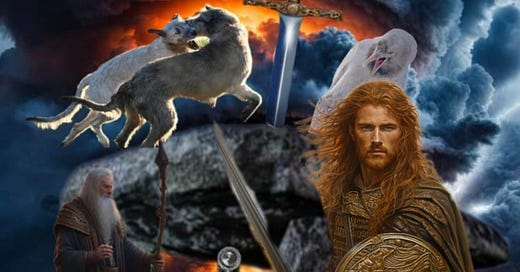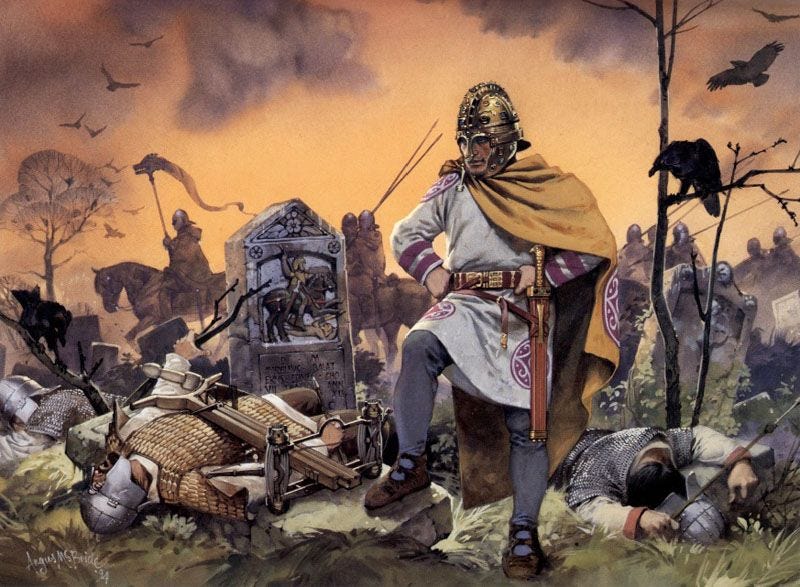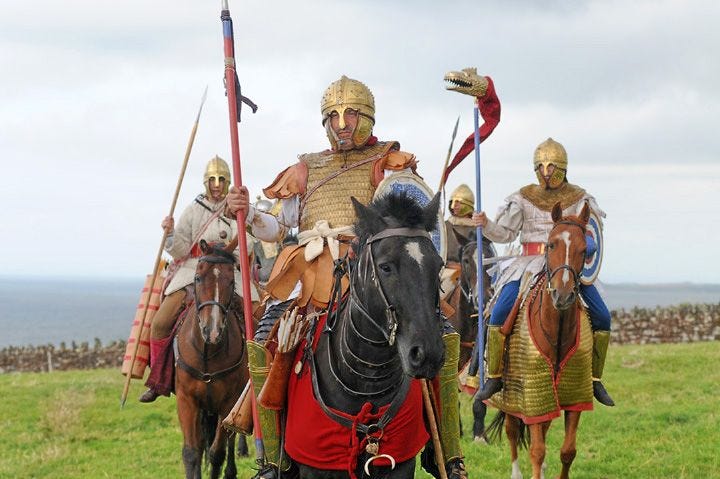Arthur
The once and future king.
The hero of Welsh, Breton, and medieval English legends.
Was there any actual historic basis for this transcendent paragon of Knightly virtues?
The short answer is, yes.
The long answer is, it is complicated.
From medieval Welsh sources in the Mabinogian, we have only one reference, involving a quest to the underworld Annwn.
We have a reference from the sixth century poet Taliesin, in the Gododdin, of the fall of the last of Arthur's valiant warriors.
We have the medieval Mallory, Le Morte De Arthur, Geoffrey of Monmouth in his history of the Kings of Britain, and the Norman poet Chretien de Troyes as sources.
In historic sources we have vague references in Gildas and the Venerable Bede.
Yet, for a King of such significance we seem to have no direct evidence.
The late Migration era, specifically the fourth and fifth century CE, was an era of immense turmoil. Few records survived.
From medieval sources, leaving obvious mythic references aside we have some references to build up on.
What real world references we have speak of A war leader that united the feuding British kingdoms and temporarily halted the Saxon expansion into Britain.
A King that that campaign in Gaul, and disputed with the Romans.
I would suggest one of the problems comes from the titles used during the Fourth and fifth century.
Such as,
Vortigern, “Great King”, a title not a proper name as used in literature.
Dux Bellorum, War Duke in Latin.
Riothamus , the Latin rendering of the Brythonic Rigothamos. Meaning King on the Thamus, Thames river.
There do happen to be direct references to a British King, in the Fifth century that was King of the Britons, ruling both in Britain proper and the Britons of Armorica, modern day Brittany.
A king that answered the call for aid from the Roman Emperor Anthemius, to fight against the Visigoths under Euric in Gaul.
This King, referred to only as RioThamus king of the Britons, sailed up the Loire river, bringing twelve thousand men, meeting Euric near the town of Avallon.
For some reason, the promised Roman forces did not arrive and RioThamus, met the forces of Euric at Deols. Vastly outnumbered by the Visigoths and was defeated.
Some of the British forces managed to withdraw to the walled city of Avallon, in Gaul, while the remainder withdrew to the realm of the Burgundians, then Allies of Rome.
According to the letters of Sidonius Apollinaris, the Britons were betrayed by the Praetorian Perfect of Gaul, Arvandus. A letter by Arvandus , to Euric was intercepted. The letter proposed destroying the Britons and dividing Gaul between Euric, Arvandus and the Burgundians.
Gregory of Tours also references this.
My conclusion from this is,
Yes there was a Fifth century British King that the core myth is based upon.
Ambrosius Aurelius RioThamus Dux Bellorum, RigoThamos Artos Pendraeg (Head/chief Dragon- war leader) in the Brythonic.
It is clearly evident to me that many Celtic mythic symbols were tagged onto the historic basis, and that later, medieval Norman chivalric traditions were added as well.
Why was this Fifth century King so remembered in history?
I propose a theory.
Arthur, and his cavalry stopped the rapid expansion of the Angles and Saxons in Britain, also, securing the Britons of Armorica against the advancing Franks, and Visigoths.
It is noticeable that the Gothic invasion of Gaul and Iberia, did not subsume Armorica.
Essentially, this King, Arthur, provided a breathing space that ensured the survival of the Britons, preventing a genocide.
That is my personal theory.
Taking the aforementioned, adding Welsh mythology, I crafted my version of the saga.
Aerons Flame.
And the Tears of Aeron series, the Mythic story behind the creation of Great Britain, the British Empire, Canada, the United States, Australia, New Zealand, and of course, Brittany.
References:
Geoffrey Ashe ;
The Discovery Of King Arthur, 1985
.
The letters of Sidonius Apollinaris.
Jordanes, Getica; XLV. 237-238
Gregory of Tours; Historia Francorum.
Geoffrey of Monmouth, History of the Kings of Britain.
Thomas Mallory; Le Morte De Arthur.
Chretien de Troyes;
Erec and Enide ,Cliges, Lancelot or the Knight of the Cart, Yvain or the Knight with the Lion, Perceval or the Story of the Grail.
The Mabinogian; Owain.
The Gododdin.








